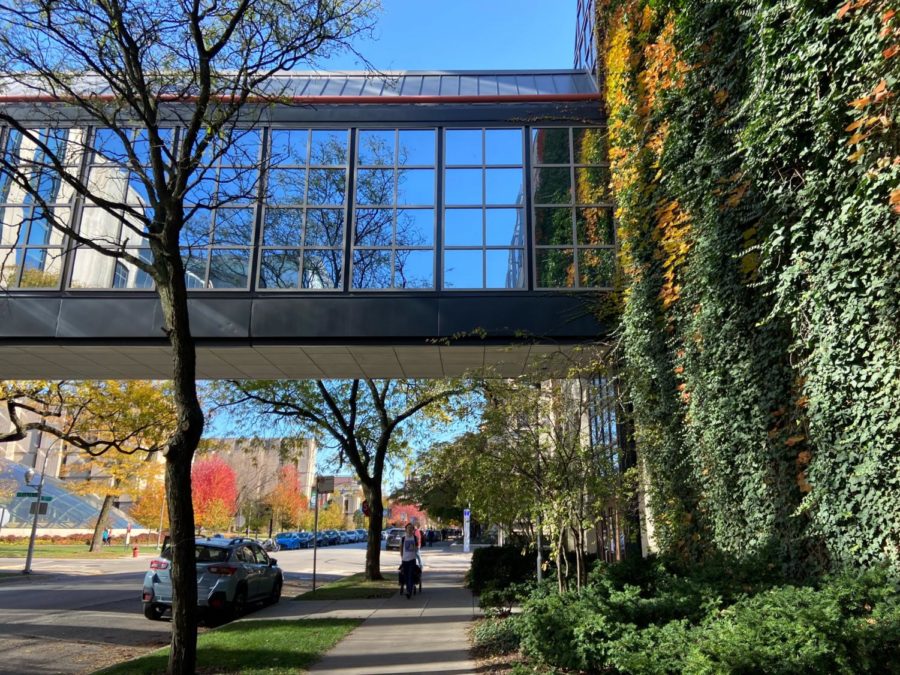
Meghan Hendrix
The bridge between the Kersten Physics Teaching Center and the William Eckhardt Research Center.
In an open letter to University Provost Katherine Baicker sent on Wednesday, faculty members expressed concern over the University’s request to “temporarily suspend” non-personnel spending on federal grant projects in response to a Trump administration freeze on federal spending.
“We are troubled that our University administration seems so eager to over-comply with this vague and problematic Memorandum, which seems designed to chill the free activity of members of civil society and its institutions, including scientists, professors, and universities,” the letter, signed by more than 100 faculty members, read.
After the freeze was blocked by a federal judge on Tuesday evening, the Office of Management and Budget (OMB) rescinded the initial memo implementing it, but the White House later signaled that grants may still be frozen in the future.
Peer institutions issued messages to their communities in response to the freeze in federal funding. In a statement to the community, the president of Brown University emphasized the university’s commitment to academic freedom. Students, faculty, and staff at Stanford University were instructed to continue research activities as normal.
Baicker’s initial response to the OMB memo caused concern for several faculty members, including David Pincus, an assistant professor of molecular genetics and cell biology.
“It seems like either a signal that UChicago is going to be overly compliant with whatever administrative directives are issued, or the underlying finances of the institution are such that we can’t continue to support research even for 20 days,” Pincus told the Maroon on Wednesday morning. “Either of those things gives me, personally, less confidence in the provost’s leadership.”
In a follow-up email sent to faculty members and researchers on Wednesday evening, Baicker instructed researchers to continue with normal operations unless they received direct communication from federal agencies.
“We are committed to supporting our research community and reaffirming its centrality to our work at the same time that we address in real time a changing regulatory environment,” Baicker wrote. “The broader landscape of federal funding for academic research remains uncertain, and in the days ahead we may face similar challenges to our core work. We will continue to do all we can to protect and support your research and scholarship and minimize disruption to researchers, staff, and students, while striving to share clear information as we learn more.”
Joseph Thornton, a professor in the Department of Ecology and Evolution, told the Maroon that Baicker’s second email was more reassuring.
“Everyone is waiting to see what the White House’s next attack on civil society will be, including universities and science,” Thornton said. “And we will have to meet that moment when it happens, and we hope that the University leadership will take a strong role in protecting the research mission and the educational mission of the University. They made a misstep with that initial message from the provost, but I’m hopeful that that was an aberration.”
Sarah Cobey, another professor in the Department of Ecology and Evolution, said her colleagues at the National Institute of Health (NIH) had been faster to respond to the Trump administration policy than the University.
“Frankly, the speed of communication that I have with my colleagues and some of these NIH-funded consortia is a lot faster than the University’s communications. And so, I really am getting most of my information from my network of colleagues,” Cobey said of policy changes made by the Trump administration. “But I do think the University is trying to communicate with us too.”
Pincus, who supervises the Cellular Adaptation Lab, told the Maroon that between 80 and 85 percent of the federal grants his lab receives are spent on personnel expenses. He estimated that the lab has “six months of runway where we could at least continue operations as normal” in the event of a funding freeze.
Cobey told the Maroon that Provost Baicker’s initial request, that faculty “temporarily pause” non-personnel spending, would have had a substantial impact on research projects across campus, halting travel and the purchase of new equipment.
“What I was immediately concerned about was with travel that we needed to book and UChicago’s ability to issue sub-awards, which would cause substantial delays in our research,” Cobey said. “And right now we have a randomized clinical trial that’s finishing up and for which we really badly need to send money to some of the researchers to finish analyzing the specimens.”
The Trump administration has issued several other directives since taking office that could affect the University, such as ending federal DEI programs and pausing official NIH communications.